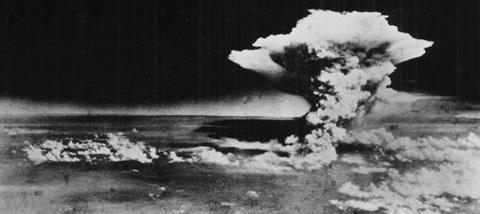
For pacifists, Christian or otherwise, the answer is clear: since any deliberate killing is wrong, the dropping of the bombs was wrong two hundred thousand times over.
But that clear answer generates further questions whose answers aren’t so obvious. If killing is always wrong, then the United States should never have gone to war against Imperial Japan and therefore its ally, Hitler’s Germany. What, then, would have stopped the triumph of brutally racist Japanese imperialism in Asia and massively murderous Nazism in Europe? The noble witness of innocent non-violence?
Unfortunately, the historical evidence is that the kind of people who ran the slave-labour camps in Burma and the likes of Dachau in Germany and Auschwitz in Poland were not at all shamed by the face of vulnerable innocence; on the contrary, it excited their lust for domination and they fed upon it.
On the other hand, those who think that war can sometimes be justified, might judge that the mass killing of civilians by the atomic bombs was indiscriminate and therefore unjust. But there are two problems here. The first is that the vast majority of people, certainly in the UK and the USA, regard the war against Hitler and his allies as morally justified, notwithstanding the fact that that cost between 60 and 80 million deaths, well over half of them civilian.
And the second problem is that 'just war' thinking doesn’t say that we may not kill civilians; it only says that we may not kill them intentionally. If a military objective can’t be achieved except by risking the possible or probable deaths of civilians, then it may still be attempted, provided that the objective is sufficiently important and that all reasonable measures are taken to avoid or minimise the side-effect of civilian casualties. The reason for this permissiveness is that in most circumstances just war would be impossible to prosecute otherwise.
So for the 'just war' proponent, if the intention in dropping the atomic bombs on Japan was to destroy vital military targets, and if there was no more discriminate way of achieving that end, then the bombing was morally justified. It was deeply, deeply tragic - but nevertheless just.
If, however, the intention in dropping the bombs was to use the indiscriminate and mass slaughter of civilians to terrorise the Japanese government into surrender, then it was immoral. Why? Because if it’s morally okay to use civilians in that ‘terroristic’ fashion, then no limits remain on what we may do in war.
Which of those two hypotheses best fits the facts of the bombing of Hiroshima and Nagasaki an historian would have to tell us. For what it’s worth, my own amateur impression is that the second case fits best: the intention in dropping the bombs was more ‘political’ (or terroristic) than military. If that is so, then they shouldn’t have been dropped.
But those of us who take that position have to reckon with a very uncomfortable fact: that the alternative to forcing Japan’s surrender by dropping the bombs was a land invasion, which would probably have cost many hundreds of thousands more human lives, and probably many more civilian lives, than the atomic bombs themselves.
The predicament is dreadful. As St Augustine once wrote when contemplating the dilemmas of coercion, 'Trembling and fear have come upon me and darkness has covered me, and I said, "Who will give me wings like a dove’s?" Then I will fly away and be at rest [Ps 55.5-6]'. But we can’t fly away; we have to stay and decide.
O Lord, have mercy upon us.
Nigel Biggar is Regius Professor of Moral and Pastoral Theology, and Director of the McDonald Centre for Theology, Ethics, and Public Life, at the University of Oxford. He is the author of In Defence of War (2013) and of Living with Trident (The Scottish Review, May 2015).
To read an alternative viewpoint, 'Hiroshima was an act of mass murder', click here
To receive a free copy of Premier Christianity magazine click here



























